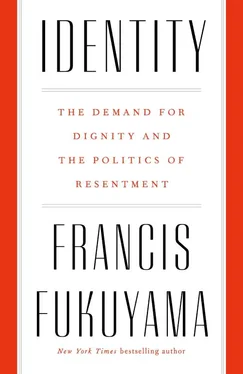The therapeutic model arose directly from modern understandings of identity. It held that we have deep interior spaces whose potentialities are not being realized, and that external society through its rules, roles, and expectations is responsible for holding us back. This requires both an individual plumbing of that inner space and a potentially revolutionary agenda to liberate us from the restraining rules. The therapist was not particularly interested in the substantive content of what was inside us, nor in the abstract question of whether the surrounding society was just or unjust. The therapist is simply interested in making his or her patients feel better about themselves, which required raising their sense of self-worth.
The rise of the therapeutic model midwifed the birth of modern identity politics in advanced liberal democracies. Identity politics is everywhere a struggle for the recognition of dignity. Liberal democracies are premised on the equal recognition of the dignity of each of their citizens as individuals . Over time, the sphere of equal recognition has expanded both quantitatively, in the numbers of people accepted as rights-bearing citizens, and qualitatively, in an evolving understanding of recognition not just as formal rights but as substantive self-esteem.
Dignity was being democratized. But identity politics in liberal democracies began to reconverge with the collective and illiberal forms of identity such as nation and religion, since individuals frequently wanted not recognition of their individuality, but recognition of their sameness to other people.
11
FROM IDENTITY TO IDENTITIES
The 1960s witnessed the emergence of a series of powerful new social movements across the world’s developed liberal democracies. In the United States, the civil rights movement demanded that the country fulfill the promise of racial equality in the Declaration of Independence and written into the Constitution at the end of the Civil War. This was soon followed by the feminist movement, which similarly sought equal treatment for women, a cause that both stimulated and was shaped by a massive influx of women into the labor market. A parallel sexual revolution shattered traditional norms regarding sexuality and the family, and an environmental movement reshaped attitudes toward humanity’s relationship with nature. Subsequent years would see the emergence of other movements promoting the rights of the disabled, Native Americans, immigrants, gays, lesbians, and eventually transgender people.
Europe saw a similar explosion following the événements in France in May 1968. The old French left was formed around a nucleus of hard-core Communists, whose sympathizers included famous intellectuals such as Jean-Paul Sartre. Their agenda remained focused on the industrial working class and Marxist revolution. In the 1968 uprisings, those preoccupations were displaced by many of the same social issues that were roiling the United States: the rights of minorities and immigrants, the status of women, environmentalism, and the like. Proletarian revolution no longer seemed relevant to the issues facing contemporary Europe. The student protests and widespread strikes that took place across France echoed similar developments in Germany, the Netherlands, Scandinavia, and other places. This “generation of 1968” on the left was no longer focused single-mindedly on class struggle, but rather on support for the rights of a broad range of marginalized groups.
These social movements emerged as they did out of the aspiration of liberal democracies to recognize equally the dignity of all citizens. But democracies never live up to this pretension: people are often judged not on their individual character and abilities, whatever the law says, but on assumptions about them as members of groups.
In the United States, these prejudices were, shamefully, reflected for many years in formal laws that did not allow black children to be educated together with white ones, or that denied women the vote on the grounds that they were insufficiently rational. But even when those laws were changed to desegregate schools and enfranchise women, the broader society did not suddenly cease thinking of itself in group terms. The psychological burdens of discrimination, prejudice, disrespect, or simple invisibility remained ingrained in social consciousness. They also remained because groups continued to differ from one another in their behavior, performance, wealth, traditions, and customs.
The new social movements that appeared in the 1960s arose in societies already primed to think in identity terms, and whose institutions had taken on the therapeutic mission of raising people’s self-esteem. Up until the 1960s, concern with identity had largely been the province of those who wanted to actualize their individual potentialities. But with the rise of these social movements, many people naturally came to think of their own aims and objectives in terms of the dignity of the groups of which they were members. Research on ethnic movements around the world has shown that individual self-esteem is related to the esteem conferred on the larger group with which one is associated; thus the political would affect the personal. {1} 1 Donald Horowitz, Ethnic Groups in Conflict (Berkeley: University of California Press, 1985), 141–43.
Each movement represented people who had up to then been invisible and suppressed; each resented that invisibility and wanted public recognition of their inner worth. So was born what we today label as modern identity politics. Only the term was new; these groups were replicating the struggles and perspectives of earlier nationalist and religious identity movements.
Each marginalized group had a choice of seeing itself in broader or narrower identity terms. It could demand that society treat its members identically to the way that the dominant groups in society were treated, or it could assert a separate identity for its members and demand respect for them as different from the mainstream society. Over time, the latter strategy tended to win out. The early civil rights movement of Dr. Martin Luther King, Jr., simply demanded that American society treat black people the way it treated white people. It didn’t attack the norms and values that governed the way white people dealt with one another or demand that the country’s basic democratic institutions change. By the end of the 1960s, however, groups such as the Black Panthers or the Nation of Islam emerged that argued that black people had their own traditions and consciousness; black people needed to take pride in themselves for what they were and not for what the broader society wanted them to be. In the words of the poem written by William Holmes Borders, Sr., and recited by the Reverend Jesse Jackson, “I may be poor, but I am—Somebody!” The authentic inner selves of black Americans were not those of white people, but were shaped by the unique experiences of growing up black in a hostile white society. This experience was defined by violence, racism, and denigration and could not be appreciated by people who grew up differently.
These themes have been taken up in today’s Black Lives Matter movement, which arose in response to police violence in Ferguson (Missouri), Baltimore, New York, and other American cities. This movement broadened over time from a demand for justice for individual victims such as Michael Brown or Eric Garner, to an effort to make people aware of the nature of day-to-day existence for black Americans. Writers such as Ta-Nehisi Coates have connected contemporary police violence against African-Americans to the long historical memory of slavery and lynching. This memory constitutes part of a gulf of understanding between blacks and whites based on their different lived experiences. {2} 2 Ta-Nehisi Coates, Between the World and Me (New York: Spiegel and Grau, 2015), 7–10.
Читать дальше












